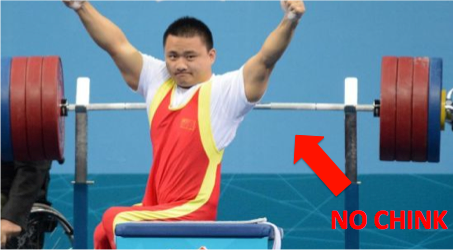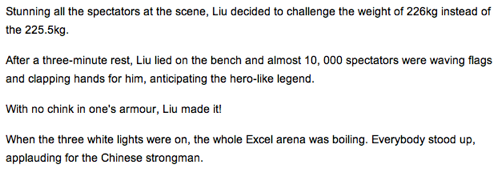
One of my pet peeves is people, Asian or otherwise, pretending to be offended when someone intentionally or unintentionally uses the word chink in a totally non-racial context. (People who are actually offended are only slightly better.) Example: Jeremy Lin, ESPN headline: “Chink in the armor.” We get it: Lin’s Asian, chink isn’t the best choice of term there. But you know what? Chink is also a cool word. It means a narrow opening or crack. Even better, it refers to a narrow beam of light admitted by an opening. It sounds like the thing it’s meant to describe, for I always think of the sound a sword makes on plate armor, and the ensuing gash — the word literally means a high-pitched ringing sound. It’s everything you would want a word to be, combining multiple senses, and it’s certainly better than dent or jangle or tinkle (unless, of course, you mean peeing, in which case nothing beats “tinkle”).
It’s unfortunate that true racists have sensitized America to the point where a word like “chink” and a phrase like “chink in the armor” can never be utilized in the vicinity of Asians. But we can fight back, you know. We can take this word back from the racists, and we do that by stop being such whelps — or the Asian American Journalists Association — whenever we hear the term. Besides, there are so many more insulting things one can say… unless one is an idiot, in which case, I don’t know why you’d take that person seriously to begin with.
All this is a longwinded way of saying look at what Xinhua has written:
With no chink in one’s armour, Liu made it!
That, my friends, is what an offensive sentence looks like. Not racist, just terrible. TURRIBLE! And if you’re wondering about the context:

Congratulations to Liu Lei, powerlifting gold medalist at the Paralympics. Congratulations to Xinhua, for being you.
(H/T Alicia)

















































In America, “rapeseed” is called Canola… America is weird.
As a lurker of 3 months I enjoy reading your blog and find your posts interesting. This one, however, is disappointing.
I don’t really see your point – are you saying that we shouldn’t be offended by the deliberate but plausibly deniable use of a known racial slur in a headline regarding J. Lin because an Asian newspaper used the same word? Or are you saying that because you are personally above being offended by it then other Asians are idiotic for not being as evolved as you?
None of these arguments make any sense. Strangely enough I actually agree with you that we shouldn’t be offended by racial slurs – but only because racial slurs aren’t meant to offend; their intent is to put the target in their place.
So the Lin headline is not unfortunate or even offensive, it is simply reminding America that Lin may be good at basketball, but remember he is still only a chink – which diminishes both his talent and his humanity.
I see no reason to be offended by this but every reason to be disturbed and perhaps even afraid. Remember that despite Lin’s obvious abilities he was overlooked in the draft, and was the target of extreme racial abuse during his college ball career. In both cases even though he proved that he could compete with the best it didn’t matter because he was just a chink and out of place in the basketball world – he just didn’t know his place.
So racial slurs are far more than terms of offensiveness – in fact if you are offended by them then you’ve missed the point because their aim is to remind you (and the community in which you hope to succeed) that you’ll never quite receive the respect, acclaim, or even financial compensations that your abilities might deserve.
http://benefsanem.blogspot.com/2011/04/chinkies-and-gooks-and-slants-oh-my.html
http://benefsanem.blogspot.com/2011/05/dialogue-with-simon-tam.html
On Lin: the ESPN editor pretty clearly didn’t realize the alternate meaning of chink. I don’t think he was snickering at the ridiculous pun he was making when he published the headline. It deserved a rebuke, not a media and advocacy group firestorm. I understand that people can use the word as a way of putting Asians in their place — by the way, those people deserve our pity and probably mockery, because they’re out of touch with 21st century America — but unless we as readers do a better job of identifying intent, we might as well never use the word ever (and I might have hyperbolized in my praise of it, but it’s still a fine English word).
Thanks for the comment. Sorry about the delay in approving it – spam-guard kicks into effect when two or more hyperlinks are posted.
Well, I don’t think it is established that there was no racializing intent in the headline – sure we have an apology and a denial but words are cheap, and I find it hard to believe that Americans aren’t familiar with the slur. They just don’t see why Asians have a problem with it, but that doesn’t mean it isn’t unfairly and needlessly racializing us as individuals, nor does it diminish its derogatory nature when used in this way.
I would also disagree that people who have these kinds of attitudes towards Asians are out of touch with 21st century America. That is entirely the problem – it isn’t marginalized supremacists who are expressing anti-Asian attitudes or casually throwing around racial slurs. It is fully integrated members of the community who may, or may not, have positions of influence over the lives and opportunities of Asian people.
It doesn’t HAVE to be a word that racializes or diminishes us as individuals, especially when it’s used in a non-racial context, e.g., “chink in the armor.” The Xinhua example above serves that point: if Chinese people don’t know or care about the implications of the term, why do we continue CHOOSING to make a bit deal out of it? And I do believe — however controversially — that Asian Americans have, to a degree, made a conscious choice to be offended by “chink,” almost as a protest against their status as the “silent minority.” Prime example: the Asian American Journalists Association link in the text.
Disclaimer: I say this as someone who’s never been directly called a chink, in the manner that can indeed be derogatory and hurtful in a meaningful way, so the issue isn’t personal to me. I’ve probably put myself out on more of a limb here than I intended.
Tao
That thinking is in the same vein as downplaying slavery because Africans helped to enslave other Africans – it doesn’t change the nature of the problem it just deflects from meaningful dialogue. A strong case can be made that the use of chink in the ESPN headline was intended to racialize Lin which is an all important point because often the nature of anti-Asian prejudice is deliberately ambiguous and can be plausibly denied (see the murder of Vincent Chin for an extreme example) as irony, innocent ignorance, or humour. Meanwhile the damage is done and forgotten only to be repeated the following generation.
As for the Asian Journalist list I don’t entirely agree with how they went about the issue, but their list of do’s and don’ts only highlights the fact that white (or black) public figures don’t have to contend with a list of racializing qualities and personal attributes (entirely made up by a culture of racist thinking) that supposedly shed light on their characters or abilities, but which are casually applied to Asians. It really isn’t too much to ask for that the media portray individuals (Asian or otherwise) based on what they actually do or say as individuals, and not try to define them based on some random or fabricated stereotypes, or some kind of physiognomy.
My point wasn’t to downplay actual stereotyping or generalizing, which is rightly despicable, but to say we often choose to see race in an overly negative context. Returning to the ESPN editor: he was deservedly censured for terrible judgment, but I find it incredible that someone in 21st century America, working for a multibillion company, could knowingly place Lin in the context of a racial epithet with the **intent of slurring Asians/Asian Americans**. Perhaps the better example is the radio host who accidentally said “chink in the armor” (“If there is a chink in the armor, where can [Lin] improve his game?”), a cringe-worthy phrase, yes, but surely meaningless in larger contexts? (Unless, of course, you want to use it as a springboard…)
I like your point about ambiguous anti-Asian prejudice, which is loathsome when it leads to discrimination, though of course we have to acknowledge that we as human beings prejudge ALL THE TIME. And as someone living in China who’s heard plenty of locals refer to themselves as “yellow-skinned” or other Asians as “small-eyed,” I’m a bit desensitized to such blunt racial assessments, however odious.
In conclusion: Bravo to those in the world fighting for a post-racial society. It’s a noble cause, one which won’t find me standing in the way.
I have to say that I’m glad that you have been willing to engage – all too often in the Asian-American blogosphere (I’m assuming you are Asian raised in the west) people will venture an opinion but don’t want to defend their position without becoming emotional.
I will defend those who see race in a negative light on the grounds that most of the time America’s cultural allusions to Asian people are negative – that’s part of the ambiguity of anti-Asian racism, which in a way semantically defines Asians and Asian endeavours as negative.
On a final note, in China having those racial qualities doesn’t carry with a set of “truths” (mostly negative) about those individuals’ characters or potential or even their humanity. In America it does – that’s the difference.
Anyways, I’ve enjoyed the conversation! Keep up the good work with the blog! I’ll go back to lurking for a while.
>>”most of the time America’s cultural allusions to Asian people are negative”
What about “Asians are good at math”?
Thanks for the discussion. Feel free to surface again anytime!
Maybe if you had to endure a childhood and adolescence of being called a “chink” simply for looking different from everyone else, you might find the word offensive.
Not that I want to fall down the slippery slope, but I can’t help but think of the Washington bureaucrat that got fired for using the word ‘Niggardly’ even though it has no etymological relation to the word ‘Nigger’.
How deluded are you, Anthony?
“Taking it back”… what, like blacks “take back” being called nigger? Guess what, to nonblacks it just sounds like black people being derorgatory towards themselves – using a condescending term created by whites to hurt themselves. Real smooth. Because the word chink has another meaning doesn’t mean it isn’t equally as offensive…. and so if fellow Chinese called each other chinks, “taking it back” from your perspective – we are simply appeasing whites for using racially offensive terms that they used, against ourselves.
As for “he ESPN editor pretty clearly didn’t realize the alternate meaning of chink. I don’t think he was snickering at the ridiculous pun he was making when he published the headline.”—– how naive can you get? Using “chink in the armor” when it’s a Chinese or even asian about – REALLY??? Sometimes some Chinese/asian people don’t want to consider that other people – primarily whites – are racist to them, to the extent where they will make up any shit to excuse their actions.
I hope you’re not one of them.